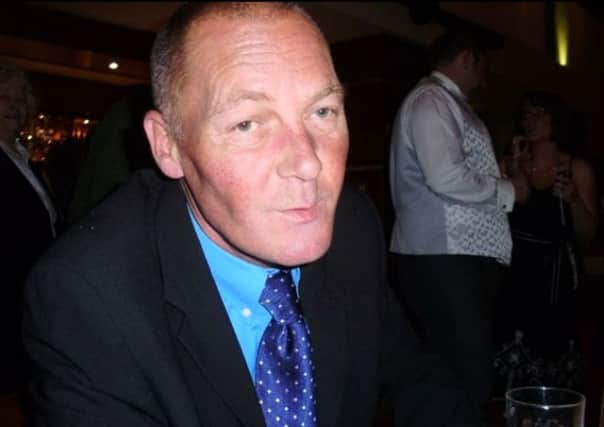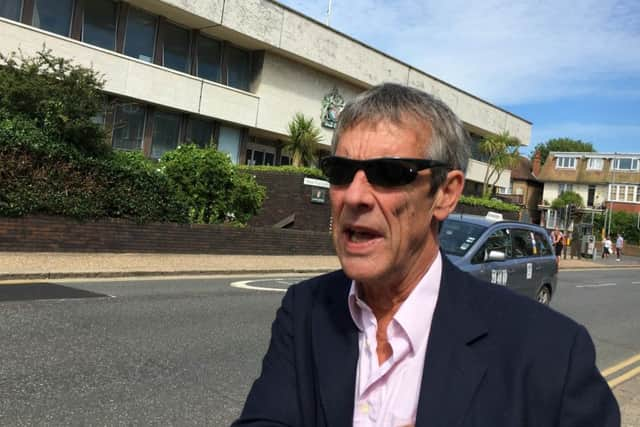Family hit out at £45,000 fine for worker's death


Basic safety measures were not in place when a mooring rope used to pull a crane snapped and killed Paul Hudghton, a court heard.
The 50-year-old self-employed scrapper died at Tipner scrapyard in Portsmouth when Diverse Ventures Ltd launched an ‘ad hoc’ plan to right a crane on a barge which had slewed out to sea.
Advertisement
Hide AdAdvertisement
Hide AdNow the firm, run by well-known businessman Henry Pounds, has been fined £45,000 over Mr Hudghton’s death on November 21, in 2012.


Night watchman Frederick Butcher was also struck by the rope. He suffered minor injuries and has recovered.
Sentencing the firm, judge Christine Laing QC said there were no basic safety measures, adding: ‘The focus was on the recovery of the boom, effectively at all costs.’
Speaking to The News, Mr Hudghton’s daughter Laura, 26, of Hayling Island, said: ‘In my view he’s got away with it – that’s change to him. I wanted to know he was suffering even a part of what we suffered.’
Advertisement
Hide AdAdvertisement
Hide AdMr Hudghton’s ex-wife Margaret Feerick, 52, added: ‘My children have all lost their father. They were absolutely devastated.’


Hove Trial Centre heard there was ‘deplorable’ weather with 40mph wind gusts when the Tori crane on a barge – used in the scrapping of ships – slewed 90 degrees to sea.
Mr Pounds suggested a block and tackle be used to bring the crane back but this could not work, a court heard.
But the court heard Mr Pounds, known as Harry, left for a meeting, and experienced crane operator Nigel Taylor and his son Danny Taylor instead used a 100ft mooring rope attached to a CAT excavator to pull the crane back.
Advertisement
Hide AdAdvertisement
Hide AdProsecutor Rebecca Chalkley said: ‘A decision was taken on that day by Diverse Ventures to carry out the operation to right one of the cranes that had slewed towards the sea. During the course of this operation Mr Hudghton was struck on the head by a large mooring rope which was being used as part of the operation.
‘Sadly it resulted in fatal head injuries and he died at the scene.’
She added: ‘There was a sudden gust of wind which blew against the elevated boom of the crane, it was at that point the mooring rope snapped.
‘It recoiled effectively like a lasso and struck Mr Hudghton causing fatal head and face injuries. Mr Butcher was also hit by the recoiling rope, he suffered bruising to his arm and hip.’
Advertisement
Hide AdAdvertisement
Hide AdShe said the decision to right the crane had been made on an ad hoc basis.
The court heard Mr Hudghton, who lived on Hayling Island, had been in the ‘snap-back’ area but no planning or risk assessment was done or communicated to him or others.
He was working on a boat when he went to help and was struck by the recoiling rope.
Diverse Ventures pleaded guilty under section 3 of the Health and Safety at Work Act 1974 earlier this month.
Advertisement
Hide AdAdvertisement
Hide AdPaul Rogers, for the company, said the crane had been dangerous after it moved and the workers had wanted to right it.
He said: ‘In the heat of the moment insufficient thought was given to what might happen if that operation went wrong, really of a desire to make it right.’
He added: ‘The reality is this was a breakdown in communication.’
Diverse Ventures, of Deneway House, Darkes Lane, Potters Bar, was fined £45,000 with £9,000 costs after the prosecution brought by the Health and Safety Executive.
Advertisement
Hide AdAdvertisement
Hide AdThe judge said: ‘The operation in itself may be simple but the risks involved should have been obvious anyone.
‘Clearly no thought was properly given to them.’
She added the financial impact of the fine on the company was ‘warranted’ adding: ‘This tragedy could and should have been avoided.’
Mr Pounds said: ‘I would say I’m very sorry that Paul had to die. I had to take the blame. I’m happy to do so even though it’s not all my fault.’
Speaking outside court, HSE inspector Joanne Williams said: ‘This case, which resulted in fatal injuries, highlights the need to ensure work is adequately assessed and planned and carried out in a manner which is safe taking into consideration not only your own employees but others who share a work environment.’